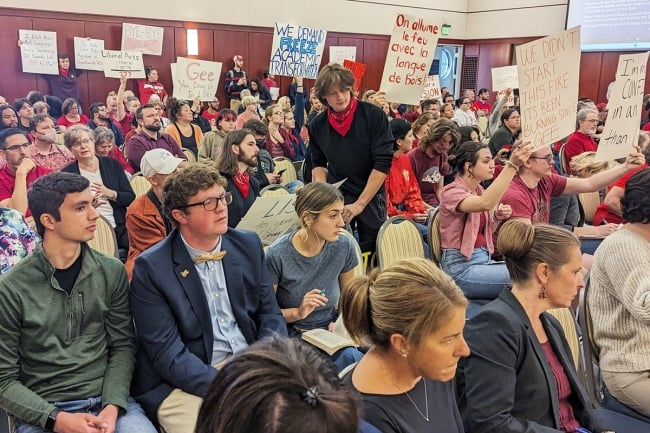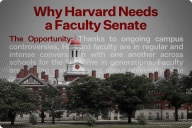You have /5 articles left.
Sign up for a free account or log in.

Students, faculty members and others filled WVU’s Erickson Alumni Center Thursday, protesting proposed academic program and faculty position cuts.
Ryan Quinn/Inside Higher Ed
MORGANTOWN, W.Va.—Christine Hoffman, as assistant chair of West Virginia University’s English department, had some sharp words Thursday for WVU’s Board of Governors.
“It’s my understanding that you’ve already stated your support for the dismantling of WVU as a public institution, and there’s little anyone can write or say today to change your minds,” Hoffman told the board. The board was hearing public comments the day before it votes on proposed cuts to faculty members and academic programs.
“So I want to tell you how you changed my mind last week, when, minutes after we took our no-confidence vote, you dismissed the informed perspectives of 797 WVU faculty,” she said into the microphone. “You changed my mind about the possibility of staying here long term.”
The proposed cuts have captured academics’ attention nationwide, with some calling it a gutting of higher education that could serve as an inspiration for other universities to follow suit. The American Association of University Professors is among multiple organizations to have raised alarm.
Hoffman, a tenured associate professor, told the board that she doesn’t know whether she’ll be among those laid off. But she said she did know something.
“I do know that there is no future for me at an institution run with such callousness, such incompetence and such reckless disregard for its own employees,” she said. “I also know I’m far from alone in arriving at this conclusion.”
The University Assembly—a rarely summoned body of all full-time WVU faculty members, with certain exceptions—did vote 797 to 100 last week to approve a resolution expressing no confidence in E. Gordon Gee, WVU’s president. It also approved, 747 to 79, a request that the university immediately freeze this “Academic Transformation” process.
Rob Alsop, WVU’s vice president for strategic initiatives, said 147 faculty positions will be eliminated from the flagship campus here, alongside 28 academic programs, if the board approves the final recommendations of the “Academic Transformation” process.
Taunja Willis Miller, the board’s chair, immediately responded to the University Assembly’s votes by defending Gee and the program-review process. Then, on Tuesday of this week, Willis Miller, her vice chairman, Gee, five past board chairs and the chairs of the separate alumni association and foundation boards signed what they titled an “An Open Letter from WVU to the People of West Virginia,” further defending the proposed cuts.
“Our goal is to create a more focused academic portfolio aligned with student demand, career opportunities and market trends,” they wrote.
During the roughly three hours of public comments Thursday, each of about 50 speakers was allotted two minutes to address the board.
.jpg?itok=m4rebkBe)
Ryan Quinn / Inside Higher Ed
Many pushed past the limit, over Willis Miller’s objections, excoriating the board and university for the proposed cuts and lamenting what they may mean to the state’s future. Of the board members, only Willis Miller spoke Thursday.
“Your open letter this week promises that WVU will maintain a strong liberal arts curriculum,” Hoffman said. “I wonder who you think is gonna stick around to do that work in this environment that you’re creating?”
Hoffman stressed the importance of a university offering a variety of programs. She said she went to the University of Missouri at Columbia, “the best journalism school in the country.”
“I knew I wanted to study journalism—and I kinda hated all of my journalism classes,” she said. “But I was at this great big university that gave me all these choices, and that meant everything … When you talk about these cuts, you’re talking about taking away those choices for students that they don’t even know they wanna make yet. We have to give them that opportunity.”
One of the recommended cuts that elicited national attention was eliminating all foreign language degree offerings, including French. Willis Miller herself started at WVU as a French major before changing to political science and graduating with a French minor. After Thursday’s public comment session, she told Inside Higher Ed that she still would have come to WVU even without that offering.
“I came to WVU because it was my state university and I got a scholarship,” she said. She said French was “not instrumental, and I’ve never used it in my daily life. It’s a beautiful language.”
Madison Santmyer, the student body president and a Board of Governors member, told board members Thursday that the student government adopted a resolution Wednesday opposing the cuts and calling for continuing to offer at least Spanish and Chinese bachelor’s degrees.
WVU’s proposed compromise, which it offered after foreign language faculty appealed, is to just teach courses, and perhaps offer minors, in only those two languages.
The American Council of Learned Societies released a statement Monday saying, “The path WVU is treading is unprecedented for a public flagship and dangerous for American higher education and society.”
Current and past WVU leaders and West Virginia’s Republican political leaders have closed ranks since the no-confidence vote, defending what the university seems poised to do on Friday. But the specter of a public, flagship, land-grant, R-1 (“very high research activity”) institution in a poor state making such cuts, and laying off tenured faculty in the process—all while denying that it’s in a budget crisis—has raised national alarm ever since the preliminary recommendations were unveiled Aug. 11.
“It is quite apparent that this is opposed by all facets of the WVU community,” Christian Rowe, a history master’s degree student and substitute teacher in the local public school district, told the board Thursday. “Our student walkout was covered in The New York Times, The Washington Post and The Wall Street Journal. The faculty voted overwhelmingly no confidence in Gordon Gee and his transformation … If you go through with this, never again can this body say that they are listening to anyone but themselves and out-of-state consulting companies that only seek to shake down the people of West Virginia and turn a profit.”
Miles Case, a third-year student majoring in environmental geoscience and a Morgantown native whose father attended WVU’s law school, told the board that “by blatantly misleading the public, and disregarding student protests, a vote of no confidence and the voices of the community, you have done nothing but successfully draw the eyes of the nation on us.”
“President Gee, you were correct when you said that higher education is under attack,” he said. “But I think you forgot to mention that you were the one who is attacking it.”
That was one of many statements that elicited cheers and applause from the audience and gaveling from Willis Miller. About half an hour into the meeting, she asked the crowd—which numbered around 200 at the start—to stop being so loud.
“They’re having a meeting next door,” she said. Immediately the crowd laughed, clapped and cheered louder.
“I was asked to ask you just to clap a little softer,” she said, eliciting more cheers and claps. “We won’t tolerate disruption; you guys are interfering with the next speaker’s time.”
AAUP Raises Concern, Politicians Not Coming to Rescue
The American Association of University Professors sent a letter to Gee and Willis Miller Thursday—an initial step in a process that could lead to an AAUP investigation and the placement of WVU on AAUP’s list of censured institutions. That list warns scholars and the public that “unsatisfactory conditions of academic freedom and tenure have been found to prevail.”
AAUP’s letter pointed to its central 1940 Statement of Principles on Academic Freedom and Tenure. The letter said that, under standards derived from that statement, terminating tenured professors “may occur under extraordinary circumstances because of a demonstrably bona fide financial exigency,” defined as “a severe financial crisis that fundamentally compromises the academic integrity of the institution as a whole” and can’t be solved in another way.
Michael DeCesare, senior program officer in the AAUP’s Department of Academic Freedom, Tenure and Governance, said AAUP standards call for faculty input on whether a financial exigency exists—and for due process, including a hearing before a faculty committee, for faculty members proposed to be laid off as a result.
“Importantly, in that hearing, the burden rests on the administration to prove the condition and the extent … of the financial exigency,” DeCesare told Inside Higher Ed.
But WVU has denied that it’s in a financial crisis.
“We are not facing a budget crisis,” says this week’s “Open Letter from WVU to the People of West Virginia” from the current and former board chairs. “Instead, the university is dealing with a $45 million structural budget shortfall that represents 3.75 percent of the overall budget. The university must prioritize resources to those areas that can provide for growth.”
Alsop, the vice president for strategic initiatives, discussed the budget with state lawmakers earlier this week. A presentation slide behind him said, in all caps, “Rumors of Our Demise Have Been Greatly Exaggerated.”
After the meeting, Gee told Inside Higher Ed that “under our board rules, we have tremendously robust due process programs.”
“Secondly of all, this is about program reconfiguration and elimination, and I think that the notion that you have to declare financial exigency to make changes is not something that is consistent with our board rules, nor do I believe that that is consistent with what we should be doing at universities,” Gee said. “We need to make changes.”
Whatever the case, West Virginia lawmakers aren’t springing to the rescue, despite criticism of their funding levels for WVU. Governor Jim Justice has said that the state had a $1.8 billion surplus last fiscal year.
Justice, a Republican, is running for Democrat Joe Manchin’s U.S. Senate seat next year. Manchin may run for U.S. president or, according to speculation, become WVU’s president. Gee said he’s leaving the role in 2025.
“I do not think there is an appetite from the standpoint of the leadership in the Legislature at this point in time to basically bail out, you know, WVU,” Justice told media Wednesday. “I think the situation is that, first and foremost, we, at least at this time, need to be there, you know, in a back-fall situation. But at the same time, what we really need to do is let WVU have the time to get their house in order.”
“What has happened is some level of bloating, you know, in programs and things that maybe, just maybe, we ought not be teaching at WVU,” the governor said. “But with all that being said, I have all the confidence in the world in President Gee and the Board of Governors that WVU will get their house in order.” The WVU Board of Governors is mostly comprised of Justice appointees.
Justice said that using one-time money without getting the “house in order” could send the university “tumbling down” in the future.
Students told the Board of Governors that it’s tumbling down now.
Elise Vuiller, a first-generation student from West Virginia’s Northern Panhandle studying American politics and policy, told the board that Gee isn’t from Appalachia and isn’t fighting for its students.
“I was never made aware of how to apply for college. WVU never once visited my high school,” she said. “And I received a coupon for a free application, and that’s why I’m here. This was my only option, and I applied nowhere else.”
“They think we’re dumb and unmotivated to get an education,” she said of outside-the-state influences. “And they think they’ll keep us dumb so they can continue to rob from us. But I say this with all love in my heart, one thing I don’t need this degree for is to smell shit, and all I smell are a bunch of pigs, and you’re posing as Mountaineers.”








